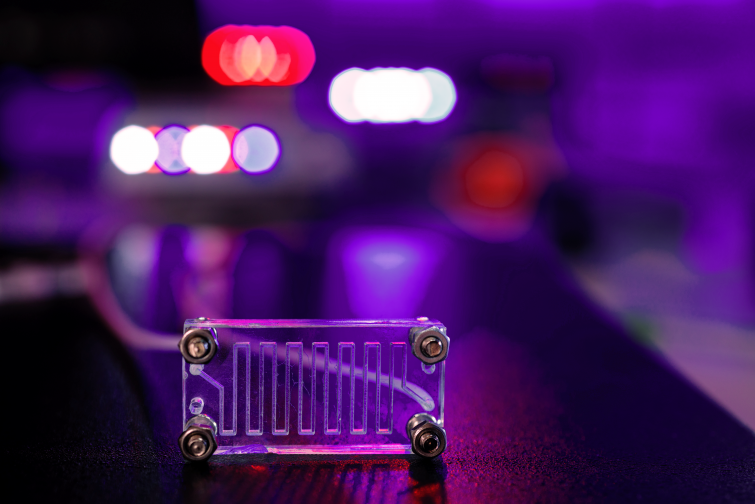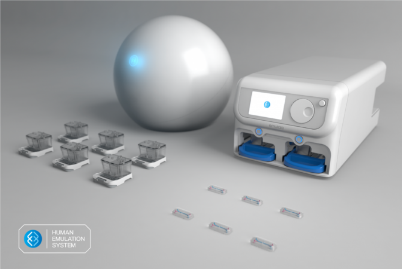
 Research
Research
Second "Organs-on-Chips" call for proposals: we take a closer look at an innovative technology that can boost your projects
Launch of the second call for proposals
In connection with its partnership with the company Emulate, the Biomaterials and Microfluidics Platform in the Department of Technology and Scientific Programs, in collaboration with the DARRI and the Pasteur Microbes and Health Carnot Institute, is launching a second call for proposals as a means of offering privileged access to Emulate's "Organs-on-Chips" technology. The platform will give up to five selected projects access to the infrastructure, expertise and human resources needed for the development of new research models using the technology.
This second internal call for proposals is exclusively open to teams on the Institut Pasteur's Paris campus and in the Institut Pasteur International Network. Scientists who responded to the 2019 call may still apply.
The submission deadline for proposals is April 14, 2020.
If you have any questions about the call for proposals, please contact OOC@pasteur.fr
- Organs-on-Chips: an audacious technological partnership that benefits scientific projects
• What the technology offers
 Based on research from the US laboratory led by Donald Ingber (Wyss Institute, Boston) and marketed by the company Emulate, Organs-on-Chips is a rapidly growing innovative technology that accurately reproduces the physiological characteristics of an organ (gut, liver, etc.) on a microfluidic chip.
Based on research from the US laboratory led by Donald Ingber (Wyss Institute, Boston) and marketed by the company Emulate, Organs-on-Chips is a rapidly growing innovative technology that accurately reproduces the physiological characteristics of an organ (gut, liver, etc.) on a microfluidic chip.
It has a host of potential uses and benefits for science in general. The use of this type of technology offers a third, middle way in addition to animal models and standard in vitro culture systems – which are practical but less effective. In the field of infectious diseases, chips also have the advantage of being extremely sensitive. They can simulate the composition and mechanics of human tissues during infection.
The technology also offers benefits at institutional level for the Institut Pasteur in its efforts to encourage and support innovation in science, particularly in relation with the emergence of infectious diseases, one of the priority areas of the 2019-2023 Strategic Plan.
• A new innovative partnership
The potential of Organs-on-Chips technology caught the attention of several scientists at the Institut Pasteur who are interested in alternative experimental methods. The scientists, in cooperation with the Biomaterials and Microfluidics Platform, have become ambassadors for the technology on campus. In April 2019, the Advanced Cell Culture Systems Conference, which focused on Organs-on-Chips technology, was held at the Institut Pasteur and demonstrated the growing interest in the technology on campus.
Following initial discussions and scientific cooperation, a "win-win" partnership between Emulate and the Institut Pasteur was set up based on Organs-on-Chips technology and the expertise of the Biomaterials and Microfluidics Platform, with the additional support of the Pasteur Microbes and Health (Pasteur MS) Carnot Institute.
Once the first machines and chips had been received, it was decided that the technology should be used for infectious disease research, specifically for research into the pathogen Shigella, which does not have a suitable animal model and for which Organs-on-Chips technology seemed an ideal option. This ambitious strategy was pursued by Nathalie Sauvonnet's team, which has been working for several years on Shigella, an agent that is pathogenic in humans. The results, published in the scientific journal Cell Host & Microbe, were promising: it was the first time anywhere in the world that scientists had been able to recapitulate Shigella infection. The results served as a "proof of concept," an encouraging sign for the proponents of this technological gamble that the chips are effective.
• Availability of Organs-on-Chips for scientific projects at the Institut Pasteur in Paris and beyond
Boosted by these first results, the Biomaterials and Microfluidics Platform decided to make the technology available for the entire campus. This led to the Organs-on-Chips Center, then the first call for proposals in association with the Center for Scientific Incentive Programs.
The first internal call for proposals was launched in February 2019, offering Institut Pasteur scientists the expertise, staff and infrastructures they needed to use the technology for their research. Five wide-ranging scientific projects (on organs including intestines, mammary glands, etc.) were selected out of fifteen projects submitted, encouraging not only the emergence of young talent but above all the development of innovative scientists who are "willing to stray from the beaten track to make progress," as Samy Gobaa explains.
Following the success of the first call for proposals and the interest shown by several member institutes in the Institut Pasteur International Network, the Biomaterials and Microfluidics Platform and the Center for Scientific Incentive Programs were keen to open the 2020 call for proposals to member institutes in the International Network, moving beyond the Paris campus and fostering a spirit of technological collaboration that involves the entire Institut Pasteur community.
Diversifying this partnership model? Opening up access to this innovative technology? Becoming an expert center, a leader in this technology in Europe?
In light of the success and interest encountered at the Institut Pasteur in relation to this technology led by the Center for Technological Resources and Research (C2RT), the Center for Scientific Incentive Platforms and the Pasteur Microbes and Health Carnot Institute, the future of Organs-on-Chips is full of promise, with the potential for effective responses to new challenges.